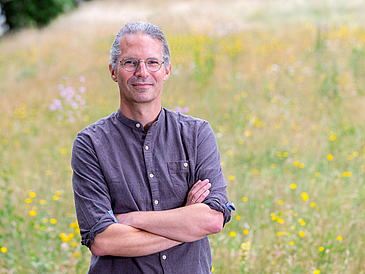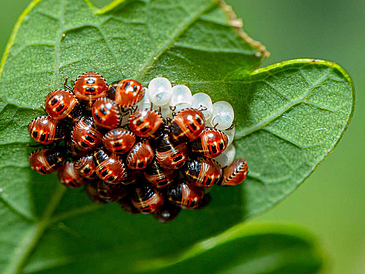He works with them. Professor Rohlfs is a zoologist. His scientific job is centered on the tiny creatures. The relaxed natural scientist (hairstyle: man bun), who has held the role of stand-in professor within the Faculty of Biology/Chemistry since 2016, would not touch a fly. In fact, he investigates fungi-insect interaction under stable laboratory conditions. Why do fruit fly larvae die despite the fact that shortly beforehand they were nibbling on the mold fungi with pleasure? Which lethal poisons were suddenly produced by the host in order to get rid of the unwanted guests? “I’m interested in what happens between the fungi and the fly and under which conditions the mold fungi develops its poisonous substances.” That is how the zoologist explains his work at the University of Bremen.
Future Aims: Substances Against Multi-Resistant Germs
It is foundation research. Yet Marko Rohlfs can truly imagine there being an application in the future. For example, the discovery of new substances that fungi only produce when they are being attacked by insects. Substances that fight against multi-resistant germs and can maybe even be used to fight cancer cells. “Fungi play an important role in the discovery of new, biologically attractive agents,” he states.
The native of Kiel was already close to nature at an early point in his childhood. “My grandfather often took me with him into nature,” remembers Rohlfs. “I was fascinated by amphibians, such as frogs and toads, and also by insects later in life.” He wanted to take this direction during his biology degree at Kiel University. However, he had in the meantime become a profound expert on the most species-rich class of arthropods. “I was addicted to insects,” jokes the now 48-year-old.
Decision for “Laboratory-Based” Research
He then decided on stable “laboratory-based” research, completed his PhD in Kiel, and habilitated. He developed the concept of interaction between fungi and flies. Subsequently, he moved on to the University of Göttingen where he delved further into the topic. Since 2016, Rohlfs has been at the University of Bremen as a stand-in professor for Thomas Hoffmeister, who, as Vice President, has been working on teaching and studies during this period.
The living environment of insects has become a hobby for the zoologist with the special field of population and evolution ecology. During his degree, he volunteered and worked for nature conservation projects, collected insects, searched for and identified red-listed species. “An important factor for the stability of the ecosystem is the diversity of plants and insects, which in turn influences birds,” explains the scientist.
“Massive Bird Deaths”
Rohlfs has observed and lamented “massive bird deaths” because the biomass of the insects is decreasing. 60 percent of birds eat insects. Especially the big ones have died. An example: the European roller. The last of these wonderful animals bred in Saxony-Anhalt and Lower Lusatia until 1990. The intensification of agriculture coupled with a lack of large insects led to their disappearance.
Doing something for biodiversity is a matter close to the zoologist’s heart. That is why he and some students are part of the nature conservation group of the University of Bremen – in short NUB. Together, they developed a concept for certain meadow areas as part of the Campus goes biodiverse project. They are no longer to be mowed. We’ll see what happens. “The special thing about the project is our scientific work.” The zoologist will therefore be determining the species-richness in the wild foliage with a group of students immediately.
Marko Rohlfs has passed his close relationship to nature on to both of his grown-up children. “They hike 20 kilometers and more with friends in nature and enjoy it,” he says pleased. That is how a fascination with the outdoors has developed from generation to generation within the family.
AG Populations- und Evolutionsökologie (in German only)
Article in up2date about the "Campus Goes Biodiverse" project



